BMW i5 Touring vs Mercedes EQS – Which car suits you better?
Both models have their strengths – but which one suits you more?
Compare performance, efficiency, price and space directly: BMW i5 Touring or Mercedes EQS?
Costs and Efficiency:
Price and efficiency are key factors when choosing a car – and this is often where the real differences emerge.
BMW i5 Touring has a decisively advantage in terms of price – it starts at 61900 £, while the Mercedes EQS costs 93900 £. That’s a price difference of around 32015 £.
In terms of energy consumption, the advantage goes to the BMW i5 Touring: with 15.40 kWh per 100 km, it’s barely noticeable more efficient than the Mercedes EQS with 16.50 kWh. That’s a difference of about 1.10 kWh.
As for range, the Mercedes EQS performs clearly perceptible better – achieving up to 816 km, about 214 km more than the BMW i5 Touring.
Engine and Performance:
Under the bonnet, it becomes clear which model is tuned for sportiness and which one takes the lead when you hit the accelerator.
When it comes to engine power, the BMW i5 Touring has a barely noticeable edge – offering 601 HP compared to 544 HP. That’s roughly 57 HP more horsepower.
In acceleration from 0 to 100 km/h, the BMW i5 Touring is to a small extent quicker – completing the sprint in 3.90 s, while the Mercedes EQS takes 4.40 s. That’s about 0.50 s faster.
In terms of top speed, the BMW i5 Touring performs minimal better – reaching 230 km/h, while the Mercedes EQS tops out at 210 km/h. The difference is around 20 km/h.
There’s also a difference in torque: Mercedes EQS pulls slight stronger with 858 Nm compared to 820 Nm. That’s about 38 Nm difference.
Space and Everyday Use:
Cabin size, boot volume and payload all play a role in everyday practicality. Here, comfort and flexibility make the difference.
Both vehicles offer seating for 5 people.
In curb weight, BMW i5 Touring is a bit lighter – 2255 kg compared to 2545 kg. The difference is around 290 kg.
In terms of boot space, the Mercedes EQS offers minimal more room – 610 L compared to 570 L. That’s a difference of about 40 L.
In maximum load capacity, the Mercedes EQS performs hardly perceptible better – up to 1770 L, which is about 70 L more than the BMW i5 Touring.
When it comes to payload, Mercedes EQS minimal takes the win – 565 kg compared to 560 kg. That’s a difference of about 5 kg.
Who wins the race?
The BMW i5 Touring proves to be has the upper hand and therefore becomes our DriveDuel Champion!
BMW i5 Touring is the better all-rounder in this comparison.
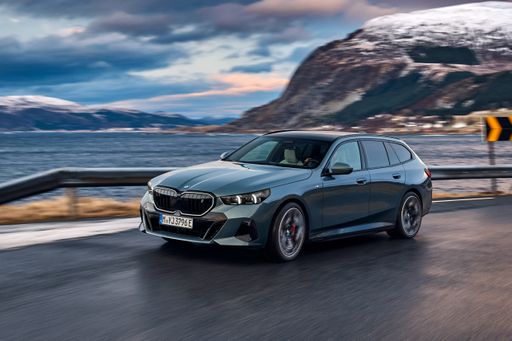
BMW i5 Touring
BMW i5 Touring
The new BMW i5 Touring combines elegant design with cutting-edge electric mobility. Its spacious interior offers both luxury and practicality, making it an ideal choice for families and long journeys. Enhanced with advanced technology, this vehicle ensures a smooth and efficient driving experience.
details @ press.bmwgroup.com
@ press.bmwgroup.com
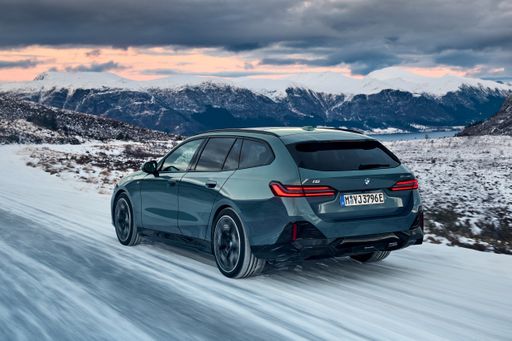 @ press.bmwgroup.com
@ press.bmwgroup.com
Mercedes EQS
The Mercedes-Benz EQS redefines luxury in the realm of electric vehicles, combining exceptional comfort with cutting-edge technology. Its sleek and aerodynamic design is a testament to both elegance and efficiency, setting new standards for the brand. Inside, the EQS offers a serene and spacious cabin equipped with the latest advancements, ensuring a refined driving experience.
details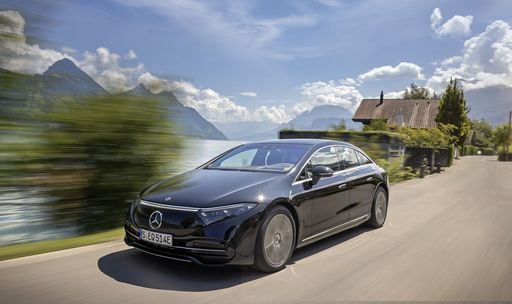 @ group-media.mercedes-benz.com
@ group-media.mercedes-benz.com
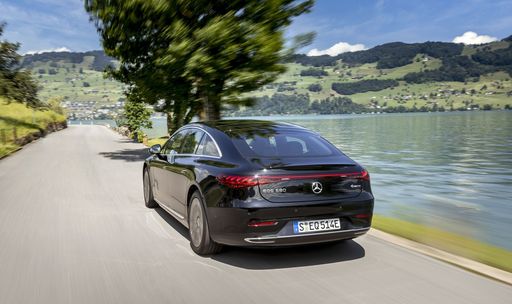 @ group-media.mercedes-benz.com
@ group-media.mercedes-benz.com
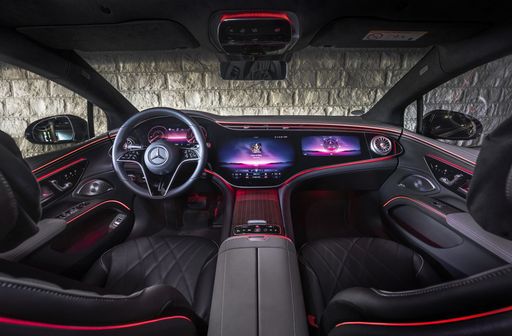 @ group-media.mercedes-benz.com
@ group-media.mercedes-benz.com
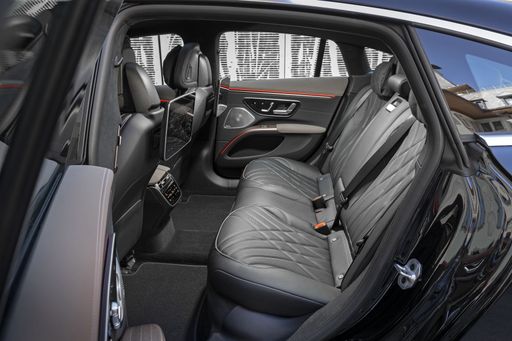 @ group-media.mercedes-benz.com
@ group-media.mercedes-benz.com
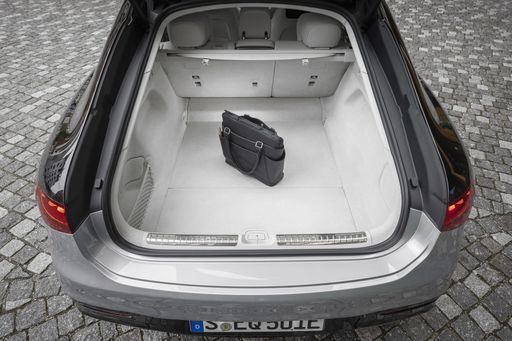 @ group-media.mercedes-benz.com
@ group-media.mercedes-benz.com

|

|
|
|
|
Costs and Consumption |
|
|---|---|
|
Price
61900 - 87000 £
|
Price
93900 - 123500 £
|
|
Consumption L/100km
-
|
Consumption L/100km
-
|
|
Consumption kWh/100km
15.4 - 17.7 kWh
|
Consumption kWh/100km
16.5 - 17.2 kWh
|
|
Electric Range
522 - 602 km
|
Electric Range
790 - 816 km
|
|
Battery Capacity
81.20 kWh
|
Battery Capacity
118 kWh
|
|
co2
0 g/km
|
co2
0 g/km
|
|
Fuel tank capacity
-
|
Fuel tank capacity
-
|
Dimensions and Body |
|
|---|---|
|
Body Type
Estate
|
Body Type
Hatchback
|
|
Seats
5
|
Seats
5
|
|
Doors
4
|
Doors
5
|
|
Curb weight
2255 - 2425 kg
|
Curb weight
2545 - 2655 kg
|
|
Trunk capacity
570 L
|
Trunk capacity
610 L
|
|
Length
5060 mm
|
Length
5223 mm
|
|
Width
1900 mm
|
Width
1926 mm
|
|
Height
1505 - 1515 mm
|
Height
1512 mm
|
|
Max trunk capacity
1700 L
|
Max trunk capacity
1770 L
|
|
Payload
535 - 560 kg
|
Payload
550 - 565 kg
|
Engine and Performance |
|
|---|---|
|
Engine Type
Electric
|
Engine Type
Electric
|
|
Transmission
Automatic
|
Transmission
Automatic
|
|
Transmission Detail
Reduction Gearbox
|
Transmission Detail
Reduction Gearbox
|
|
Drive Type
All-Wheel Drive, Rear-Wheel Drive
|
Drive Type
All-Wheel Drive, Rear-Wheel Drive
|
|
Power HP
340 - 601 HP
|
Power HP
360 - 544 HP
|
|
Acceleration 0-100km/h
3.9 - 6.1 s
|
Acceleration 0-100km/h
4.4 - 6.2 s
|
|
Max Speed
193 - 230 km/h
|
Max Speed
210 km/h
|
|
Torque
430 - 820 Nm
|
Torque
568 - 858 Nm
|
|
Number of Cylinders
-
|
Number of Cylinders
-
|
|
Power kW
250 - 442 kW
|
Power kW
265 - 400 kW
|
|
Engine capacity
-
|
Engine capacity
-
|
General |
|
|---|---|
|
Model Year
2024
|
Model Year
2024
|
|
CO2 Efficiency Class
A
|
CO2 Efficiency Class
A
|
|
Brand
BMW
|
Brand
Mercedes-Benz
|
Is the BMW i5 Touring offered with different drivetrains?
The BMW i5 Touring is offered with All-Wheel Drive or Rear-Wheel Drive.
The prices and data displayed are estimates based on German list prices and may vary by country. This information is not legally binding.
